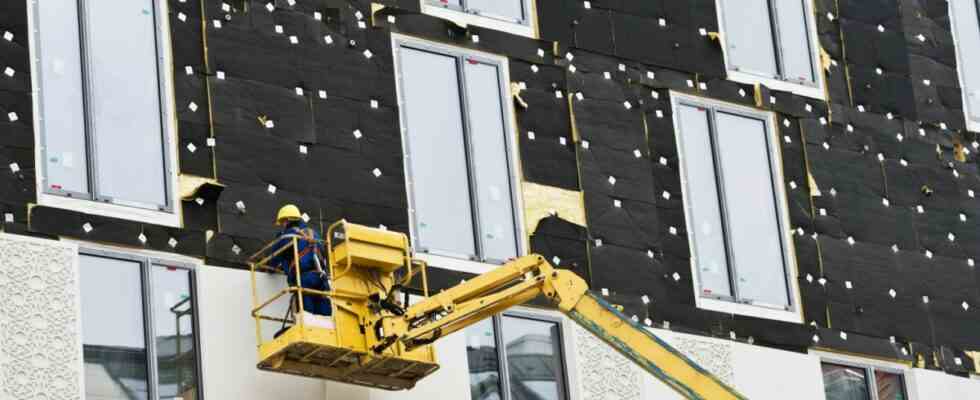The coalition factions want to lower the minimum energy standards for new houses planned by Climate Protection Minister Robert Habeck (Greens). According to information from the parliamentary groups, the specialist politicians from the SPD, Greens and FDP agreed on appropriate changes on Tuesday evening. Accordingly, the current regulations for insulation should remain, the stricter specifications for saving energy should instead be able to be achieved via the building services, for example with the help of solar modules on the roof.
It is about the so-called Building Energy Act (GEG), which regulates, among other things, the energy standards for new residential buildings. The law is intended to help Germany achieve its goal of being climate neutral by 2045. An important factor for this are the buildings, which are responsible for a large part of the greenhouse gas emissions, mainly due to heating.
In his draft law, Habeck has so far provided for better insulation according to the so-called Efficiency House 55 standard from next year. This rule is now to be overturned in the parliamentary process at the instigation of the FDP, and the traffic light factions want to submit an amendment to the Bundestag on Thursday. Accordingly, the previous regulations on isolation from 2009 would remain. According to the agenda, the draft law should be passed on the same day.
The climate policy spokesman for the FDP parliamentary group, Olaf in der Beek, said on the other hand Süddeutsche Zeitung: “We want to avoid even higher construction costs.” The FDP argues that it must be up to the builders how they achieve the required standard, whether through better insulation, renewable energy sources or other instruments. “I think higher standards will prevail on the market,” said in der Beek. Energy costs are becoming more and more important when building houses, but also when tenants decide to rent an apartment. The FDP was very committed to this “technology openness”.
SPD parliamentary group leader Matthias Miersch also defended the compromise. The Efficiency House 55, better known as the KfW 55 standard, has now been enshrined in law and it has been left open how this requirement is met in each case. “I think that’s right in times of high construction costs and housing shortages,” said Miersch. Insulation regulations are considered to be one of the reasons for rising construction costs, along with a lack of skilled workers, rapidly increasing land prices and, since last year, a lack of materials.
Experts and environmentalists criticize the compromise
A number of professional associations, on the other hand, were disappointed or even horrified by the legislative plans. “If you want to achieve climate neutrality by 2045, then you have to enforce EH 55 now, including for the building shell,” said Benjamin Weismann, Managing Director of the Energy Advisory Association GIH of the SZ. In order to save enough energy, you have to start at both points, both with the building technology and with the building envelope. But there is no progress at this point. “You then put up buildings that could be operated much more efficiently and economically,” said Weismann. It is foreseeable that these houses will have to be retrofitted in order to achieve the required climate neutrality by 2045. “But that doesn’t make economic sense for roof and wall.”
According to the expert, solar power alone won’t rip it out – especially in winter, when a lot of heating has to be done.
(Photo: Marijan Murat/picture alliance/dpa)
Good building technology such as solar modules, ventilation systems with heat recovery or heat pumps make a house more climate-friendly. “But if a lot of energy is lost through the shell, then even a good heat pump won’t help,” said Weismann. Even a solar power system cannot completely compensate for this because it does not supply enough energy in winter, when the heating requirement is particularly high.
The German Environmental Aid (DUH) sharply criticized the changes to the law as “farewell to energy efficiency”. The traffic light government is recklessly giving up the opportunity to protect consumers from rising energy costs, even in new buildings. DUH Managing Director Barbara Metz said that not much was left of the announced increase in the new building standard: “This is a victory for the housing industry, which has been lobbying massively against improved building requirements for years.”
The Ministry of Building is satisfied, Habeck’s house is silent
When asked, Habeck’s Ministry for Economics and Climate Protection did not want to comment on the compromise made by the traffic light groups. A spokeswoman for the Ministry of Construction, which was also involved, spoke of a “good overall package”. From the point of view of the SPD-led house, however, a “moderate increase” in the requirements for the building envelope would have been conceivable. Federal Building Minister Klara Geywitz had approved higher requirements for house insulation in the cabinet. “But it is also clear that more and more insulation does not always result in more energy savings.”
Now they have agreed on the “most economical option”, according to the spokeswoman. In view of rising construction prices, this is a good signal for the construction industry. Geywitz is to implement the coalition’s goal of creating 400,000 additional apartments every year. In view of rising construction prices and increasing interest rates on loans, this is hardly possible anyway.

